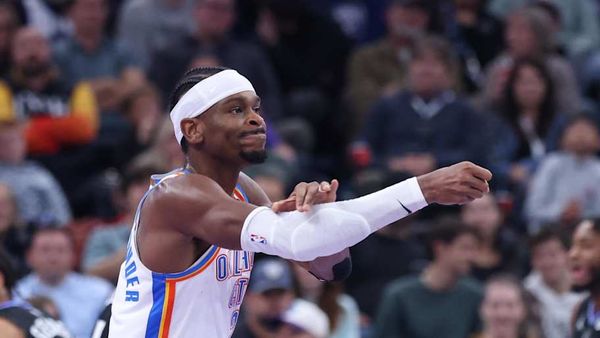
Let’s start here with an exercise, a blind taste test. In it, you are an NFL general manager. You must pick between two quarterbacks. Your legacy, not to mention your ability to remain in that job, rests on this specific decision.
The first quarterback will win NFL games at a 68% clip. He will complete passes with 64.9% accuracy, compile a touchdown percentage of 5.5 and an interception percentage of 2.7 and a QB rating of 94.9.
The second quarterback will win games at a 58% clip. He will complete passes with 58.4% accuracy and his touchdown percentage, interception percentage and quarterback rating will end up at 4.7, 3.3 and 82.1.
This choice seems obvious, right? Not so fast.
Any GM who chooses the first quarterback will win one Super Bowl. The quarterback will win another Super Bowl but not with you, the GM. Any GM who chooses the second will win two Lombardi trophies.
The first quarterback is Peyton Manning. The second quarterback is his younger brother, Eli Manning. The blind comparison is intended to make both the case for Eli’s Hall of Fame candidacy and a larger, more controversial sentiment. Here goes. *(Writer ducks behind laptop keyboard.)* Eli Manning had the best, most impactful career of any Manning, Peyton included.
The debate over his Pro Football Hall of Fame candidacy, well, wow. Here we go again. It says more about us, a nation of hot-takers, everything and everyone examined and chewed up and scrutinized to be made less than what they really were, even stars now picked apart like buzzards to a carcass. It says far less about the actual, theoretical debate: Peyton or Eli?
Related question: Why can’t we enjoy anything? Why can’t we disagree and keep it moving?
Those questions relate to this column, even, because the minute that it’s published, it will divide a nation of sports addicts in a nation that’s already deeply divided. That’s necessary to note here because the baseline of all Peyton vs. Eli debates should start with what each gave the NFL, individually, on their respective teams. Both changed the history of professional football. Both won championships. Both deserve inclusion among the best quarterbacks of their (mostly) shared era. And, critical to the point, neither won without a lot of help.
The argument that Eli, not Peyton, fashioned the best career of any Manning is the same argument for why Eli should be in the Hall of Fame. From this year’s class of finalists, Eli has easily been the most debated, and by wide margins.
The debates, in and of themselves, are fair. The cons are centered, though, in the wrong place. Let’s address those, 8 Mile–style … I know everything he’s ’bout to say against me. Without David Tyree pinning a pass attempt to his helmet, the New York Giants, quarterbacked by Eli in the 2007 season, wouldn’t have won Super Bowl XLII. Yes, those football Giants trotted out elite defenses in both that season and in the season they won another title, ’11, before XLVI. That triumph required another miracle catch, from Mario Manningham, to upend Tom Brady and the mighty New England Patriots once more.
Anyone arguing that is ignoring half of their own argument. Peyton, for as stop-and-stare good as he was, despite the staggering number of games he won, didn’t win his second championship ring until he did … the exact same thing. Manning went to Denver, and he triumphed in Super Bowl 50, behind—you guessed it—an elite defense.
Anyone arguing that, in either of Eli’s titles, an obvious argument could be made for another player—Justin Tuck, for example—to be awarded the game’s MVP, as Eli was, each time. That’s true. That’s fair. And, yet, in Peyton’s case, not only is the same argument fair, it actually happened. Von Miller won Super Bowl 50 MVP honors. That Peyton threw for more yards and touchdowns in playoff games misdirects this specific case “against” Eli.
Why? Because anyone saying Peyton compiled the better of their two careers must include his mountain of impressive statistics, which, most notably, includes the playoffs. And, in doing that, they ignore the assessment that followed Peyton through his entire career. That he struggled, even amid prolific statistical seasons, to win games that mattered in the playoffs. Voters could argue that Peyton’s statistical imprint and two Super Bowl championships gave him enough heft in the winning department for obvious, first-ballot inclusion. That’s correct. But if anyone incorporates the talent around Eli, they must do the same for the talent around Peyton.
“Against” Eli types also parse his candidacy relative to, say, Jim Plunkett’s bona fides. Plunkett isn’t in the Hall, and he also won two Super Bowls and his statistics, if lined up the right away, are better, slightly, than Eli’s.
There are several issues with this part of the Manning debate. First, comparing any modern quarterbacks to those from eras such as Plunkett’s, is a futile exercise, on its face. Plunkett didn’t have modern offensive schematics, didn’t have modern training and recovery methods, didn’t play in the NFL that became exclusively tied not to a passing fancy but a fancy of all passing. Second, the against-ers will always note that Plunkett had a better season in 1980 than Eli did in either of his Super Bowl victories. Plunkett, that reasoning extends, also had a better regular season in his championship years. This logic further obscures the only point in professional football, in professional sports, that matters: winning the whole damn thing.
Which leads to the fairest point both against Eli’s candidacy and for Peyton in the comparison between the two. Eli played 16 NFL seasons. He only led any statistical category for quarterbacks three times. And, each time, he led all other signal-callers in … interceptions.
In a vacuum, that is a valid point, one that could be deployed, fairly, to vote against including him in this year’s Hall of Fame class. But Eli never played football in a vacuum. Where Peyton threw so many touchdowns he could fill an entire room in his house with footballs from each score, Eli’s impact on the Giants wasn’t as obvious. Just don’t take that to mean it wasn’t there.
Yes, wins are not a quarterback statistic. Or not one that accurately depicts their true impact on winning seasons, necessarily. Football, as clichés describe, really is the ultimate team sport. Eli impacted games in ways that will never show up in any box score or any bullet-points list of career achievements. Anyone noting that should also note: Eli’s teams typically ran the football more, giving him fewer opportunities to pile up statistics. He still directed those offenses, still fashioned wins in so many close games. He played with a grit that was less obvious in Peyton. He also fit within the structure of his team and how it planned to win far better than Peyton did.
Yes, Peyton threw for country miles worth of yards. How well did that work in Indianapolis? He won a ton of games there. How many Super Bowl rings, though? Point is, if the task for Hall voters is to determine which quarterback had such an impact that NFL history wouldn’t be the same without him, then Peyton’s prime with the Colts and all the playoff losses, should count against his Hall candidacy. In his prime, with elite offensive teammates all around him, Peyton won a lot of games but his entire prime didn’t yield a Super Bowl win, until his ninth season when he was 30. What won the second one? A better defense, same as, yup, Eli!
For Eli: The definitive story of NFL history cannot be written without including him.
For Eli: His part in shaping that history did not, in any way, owe only or primarily to his teammates.
For Eli: He won both times against Brady and New England. With all due respect to the dynasty that’s formed but still forming in Kansas City, Eli twice met a juggernaut in the championship game, twice stood his ground and twice won. The same cannot be said for Peyton. In his career-long competition of individual accomplishments vs. Brady, Brady won, in a landslide, despite how well and how long and how consistently Peyton played. Brady can’t say that about Eli.
For Eli: He ended the Patriots’ bid for an undefeated season in 2007 (and early ’08).
For Eli: Better, yet, at least three of his throws, two passes that left Eli’s right hand and now reside high in NFL lore, directly, objectively changed the outcomes of both his Super Bowl wins. In the first one, there’s Tyree’s helmet catch and the subsequent, game-winning touchdown throw to Plaxico Burress. In the second one, there’s the Manningham catch. The Giants have zero Super Bowl victories with any of them.
For Eli: He won two Super Bowl MVPs. His brother, while also a winner of two Super Bowls, only won MVP once.
For Eli: The list of quarterbacks in NFL history who won at least two Super Bowl MVP awards is short. It features Tom Brady (5), Joe Montana (3), Patrick Mahomes (3), Bart Starr (2), Terry Bradshaw (2) and … Eli. Who’s name isn’t on that list? All except Mahomes and Eli are in the Hall of Fame. Mahomes, for anyone who hasn’t lived without electricity for the past seven NFL seasons, is the lock of all locks to go in.
I could do this all day. Point is, there’s a legitimate case to make that Eli had a better, more impactful NFL career than Peyton, period. Whether one believes this centers on how much value they place on statistical accumulation vs. NFL history. They’re not always the same thing.
The healthier approach is grounded in an understanding that has been sitting there all along. Both deserve inclusion. And, rather than parse, it’s better to appreciate both for who they are and what they did.
This article was originally published on www.si.com as Eli Manning’s Hall of Fame Case Argues He Was Even More Impactful Than Peyton.







